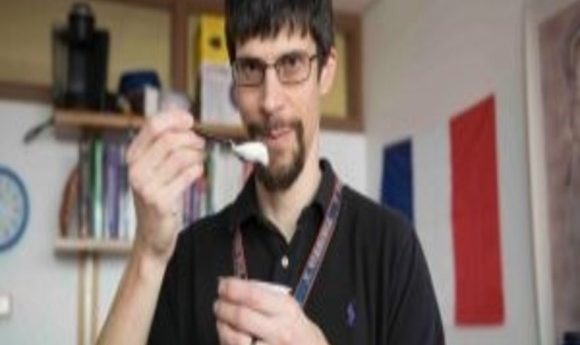Depression-fighting bacteria

One type of bacteria found in probiotic yogurt helps fight anxiety and depression.

Alban Gaultier and researchers at the University of Virginia reverse symptoms of depression in mice with Lactobacillus, a bacterium typically found in probiotic yogurt.
Credit: Alban Gaultier & University of Virginia
Among the diverse communities of microscopic bacteria that dwell in our guts, one species in particular may be gaining a reputation for its role in mental health, according to new research.
In the journal Scientific Reports, researchers report a new mechanism linking gut microbiota, mental stress, and depression. The study highlights a single bacterium typically found in probiotic yogurt, Lactobacillus, which plays a critical role in mediating certain metabolites associated with depression in mice.
“It was known that probiotics could have beneficial effects in some models of depression, but nobody has known the mechanisms by which the microbiome could improve mental health,” said Alban Gaultier, who led the study at the University of Virginia. “What was fascinating was finding that returning the gut flora to homeostasis with one bacteria was enough to fix mental health in mice.”
To learn more, Gaultier’s team sequenced genomic DNA from the microbiomes of mice before and after they were subjected to various stress events. They found significantly depleted levels of Lactobacillus in mice expressing stress-induced depression. However, by incorporating Lactobacillus into the food of the depressed mouse group, the team reversed behavioral symptoms.
Following their observations, Gaultier’s team analyzed how Lactobacillus might affect metabolites in blood samples. They learned that one metabolite associated with depression, kynurenine, was significantly boosted in the absence of Lactobacillus.
“Lactobacillus-derived reactive oxygen species influence the expression of a metabolic enzyme in the gut called IDO1, known to convert tryptophan into kynurenine,” explained Gaultier. “So, when mice have less Lactobacillus, IDO1goes, up and the consequence of this is that you have more kynurenine starting to circulate.”
Now, Gaultier’s team is conducting studies to confirm a similar mechanistic link between depression, Lactobacillus, and kynurenine in humans. The team is also seeking to further understand the activity of kynurenine in the human brain.
“Kynurenine has been shown to be a major marker for depression in humans,” said Gaultier. “The big hope is that rather than taking pills that come with a lot of side-effects, we might be able to establish a type of Lactobacillus probiotic as a supplement, which can help patients with depression.”